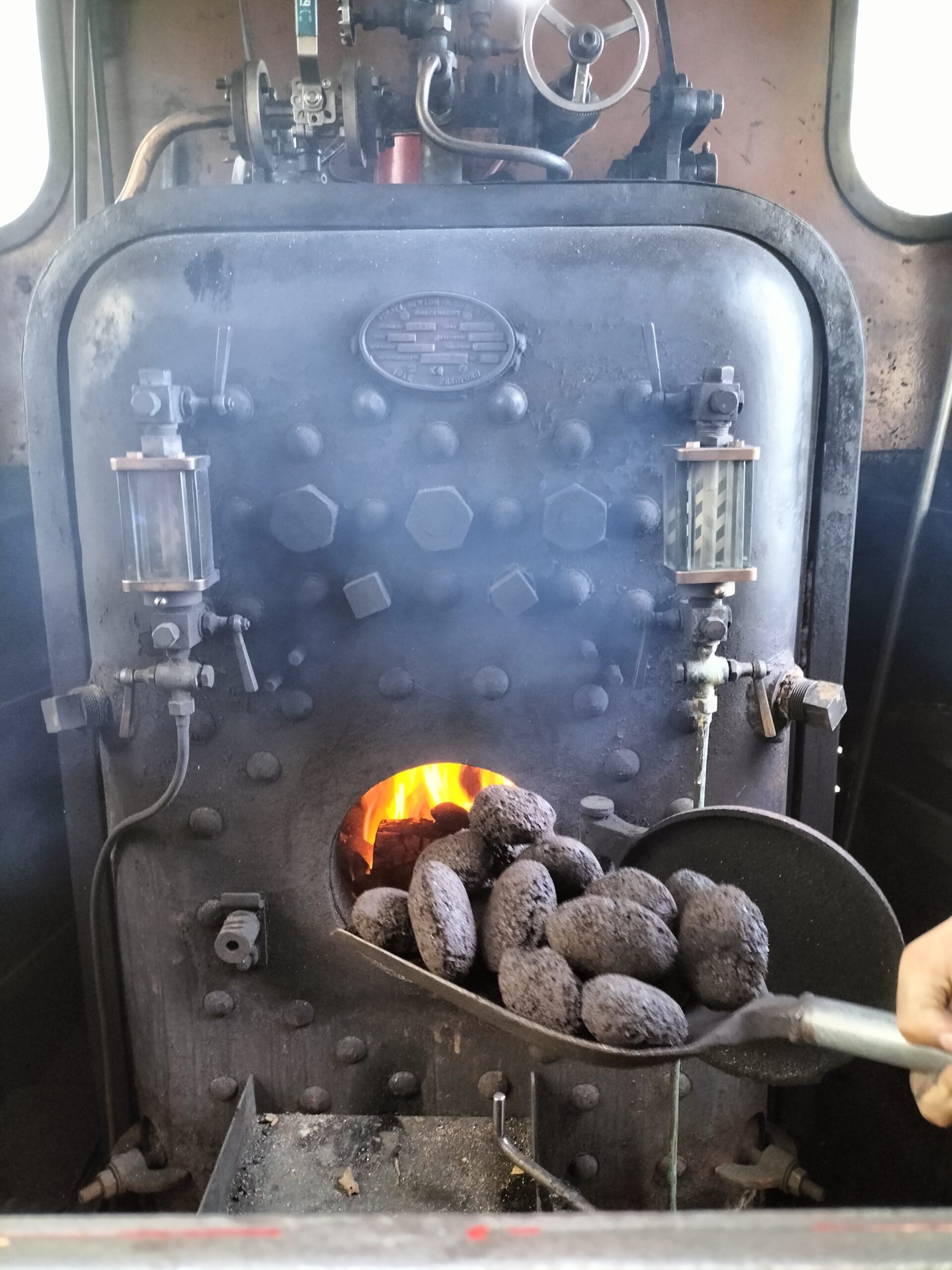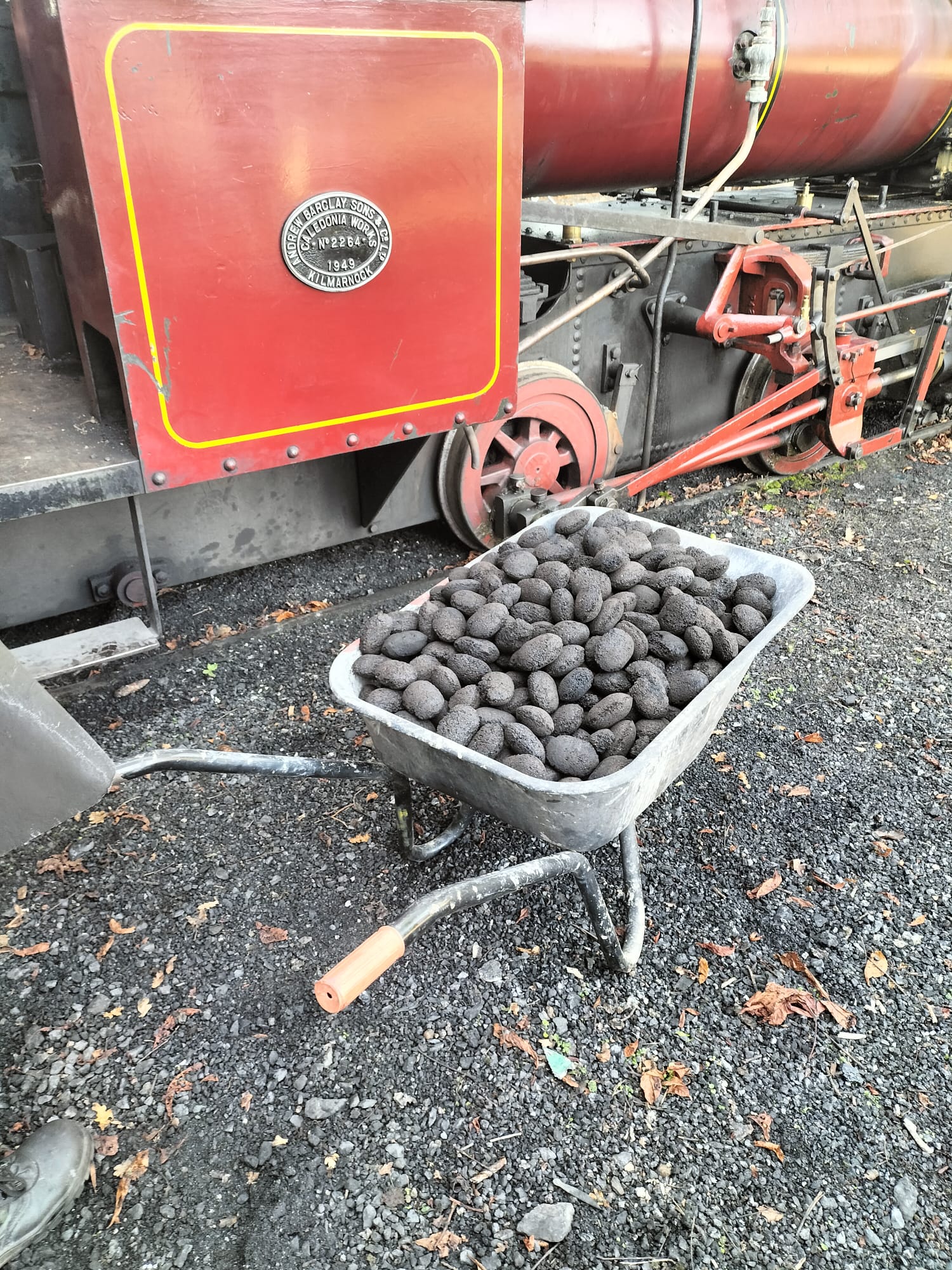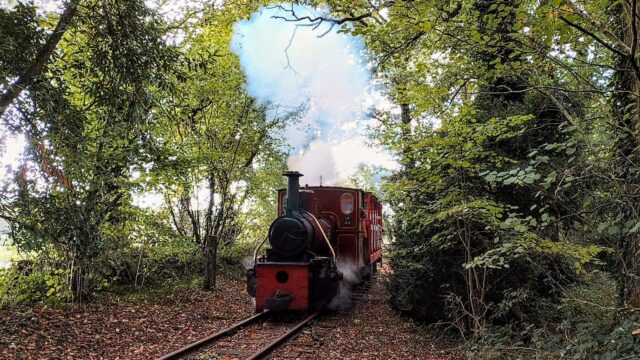The Stradbally Woodland Railway (SWR), the oldest heritage railway in Ireland run entirely by volunteers, has successfully completed the country’s first trial of biomass based coal substitute fuel on a passenger train.
On September 17 and 18, behind-closed-doors initial trials of the fuel, named Harvest Flame and developed by Arigna Fuels of Co Roscommon, took place on the railway in Stradbally.
During the trials the biocoal was used instead of ordinary coal in the firebox of a steam locomotive.
These trials proved successful and the following Saturday, September 24, the first biocoal-powered public passenger train in Irish history took to the rails.
The Harvest Flame fuel proved to be a reliable and wholly suitable alternative to coal in operating the SWR’s steam locomotive, 1949-built Róisín.
The engine performed well with the fuel once the crews adapted their operating technique to suit its properties.
The SWR is well suited to test the fuel given its steep gradients and heavy loads, allowing the crews to put the fuel through its paces in several different circumstances.
The fuel was also tested in the Mann steam tractor, a road-going steam engine once used in agriculture and recently restored by the Irish Steam Preservation Society (ISPS), who also operate the SWR.
The fuel performed well in the Mann steam tractor, which has a much smaller fire grate than the railway locomotive and demonstrated ample steam generation ability.
The fuel is made from compressed olive stones, a residue from the food industry, which undergoes a process called torrefaction. Torrefaction describes the stage in the process of pyrolysis where some of the unwanted components are driven off, the cellular structure is altered but some of the hydrocarbons and organic carbon remain.
The ISPS plans to use 10 tonnes of the biocoal during its annual National Steam Rally during the 2023 August bank holiday weekend.
This event will see dozens or road-going steam engines – steam rollers, traction engines, steam tractors – gathered for public display and demonstration alongside several other attractions ideal for a family day out.
This would make the National Steam Rally the first in the world to be a carbon neutral steam event, a sign of significant progress for the heritage industry.
The Continuity Biocoal project is a collaboration between the Irish Steam Preservation Society CLG (operators of the SWR), Arigna Fuels of Roscommon, the Irish Bioenergy Association (IrBEA) and their partners in Wales, the Severn Wye Energy Agency (SWEA), in the Interreg NWE funded THREE C Project.
The initiative highlights the close working relationship between Ireland and Wales (which has many narrow-gauge steam railways of its own) made possible by participation in a series of European transnational projects, that have focused on finding climate-friendly uses for low value, residual biomass over the last decade.
Nicola Glynn, secretary of the Irish Steam Preservation Society said: “We were excited to try this new form of fuel. Our railway and traction engine rally is in a beautiful part of Ireland, and doing our bit to help decarbonise the economy is important to us.
“Plus, our crews enjoyed not ending the day covered with coal dust, as this is a remarkably clean fuel.”
Thomas Fogarty, steam locomotive supervisor at the SWR said: “The biocoal performed well in our loco.
“Only small adjustments were needed to our crews’ normal driving and firing styles to maintain working steam pressure, most notably allowing more air at the fire grate to help the material burn more easily.
“It was a noticeably cleaner burning and virtually odourless fuel with little ash left to clean at the end of a busy running day.”
Peter Layden, Director of Arigna Fuels said: “Arigna Fuels are delighted to support the heritage steam industry, replacing the original fossil coal with Harvest Flame, our new biomass-sourced 100% renewable and sustainable fuel.
“Not only will this fuel help to drastically reduce the carbon footprint of the heritage sector, but it will also allow people to continue to enjoy first-hand the magnificent and historic engineering, a legacy of a different era.”
Stephen McCormack of IrBEA said: “IrBEA and its members continue to develop and promote sustainable forms of bioenergy.
“IrBEA is excited to be supporting this novel and innovative application of a fully sustainable biofuel in such an iconic use.
“The small steam engines of Ireland have played a very significant role in the development of energy production, industry and agriculture in our Island and it is important to keep this heritage alive whilst showing that a move to a bioenergy based, non-fossil fuel future is achievable. A new product for an old process, with much potential.”
The Continuity Biocoal project holds out the hope that much of our industrial heritage can avoid retirement to glass cases in a museum and continue to inform, educate, and give pleasure to future generations without damaging our environment further.
The UK’s National Railway Museum is also closely following the lead taken by Ireland in this field.
Heritage railways and other historic sites have so far helped the public to understand how our communities, culture and society were shaped by the fossil-fuel age; now they can tell the next chapter by showing how we can transition to a Net-Zero-Carbon future, by working together and working smarter.
Saving our only home planet need not mean having to give up everything we enjoy.


SEE ALSO – Gardai make arrests following incidents of attempted robbery and assault in Laois























